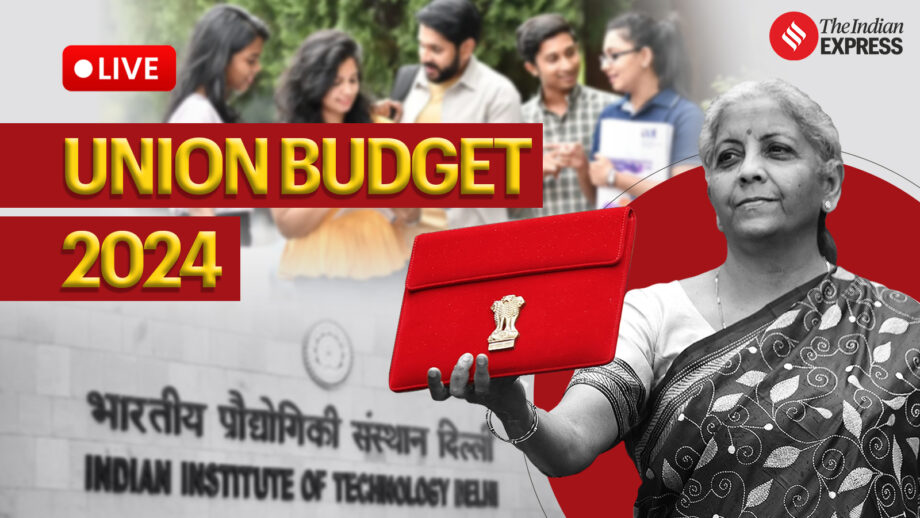- Education Budget Updates: Funding for UGC decreased by 60.99%, while grants for central universities increased by over Rs 4,000 crore in the 2024-25 interim budget.
- Early stimulation for 0-3 years covered by a Government program, providing high-quality preschool instruction daily.
- ‘Poshan bhi Padhai bhi’ program launched for Early Childhood Care and Education (ECCE) to establish a high-quality preschool network.
- National Research Foundation ‘Anusandhan’ operationalized to strengthen R&D ecosystem, with a Rs. 1 lakh crore corpus for research and innovation announced in FY25.
- India’s ascent in high-quality research reflected in climbing to 9th rank in Nature’s Index 2023, with a 44% increase in high-quality research articles in the past four years.
Education Budget Updates: Union Budget 2024 Overview
The Education sector in India has witnessed significant developments in the recent Union Budget 2024 presentation by Finance Minister Nirmala Sitharaman. The economic survey highlighted various aspects of the education landscape, shedding light on the funding allocations, policy implementations, and future strategies to enhance the quality and reach of education across the country. Let’s delve into the key updates and insights provided by the Union Budget 2024.
Impact of National Education Policy (NEP) 2020
The Finance Minister emphasized the positive outcomes of the National Education Policy (NEP) 2020, mentioning a notable increase in higher educational institutes and a rise in the enrollment of women in STEM courses over the past decade. These advancements were attributed to the NEP’s vision of transforming the educational ecosystem in India. However, a surprising move was the significant reduction in funding for the University Grants Commission (UGC) by 60.99%, bringing it down to Rs 2,500 crore from the previous year’s estimate of Rs 6,409 crore.
On the contrary, the budget allocation for central universities witnessed a substantial increase, with over Rs 4,000 crore added to reach a total of Rs 15,928 crore for the financial year 2024-25. The overall budget allocation for the Education Ministry for the year 2024-25 also saw a positive growth of 6.8%, escalating from Rs 1,12,899.47 crore in 2023-24 to Rs 1,20,627.87 crore in the current fiscal year.
Related Video

The economic survey highlighted a significant milestone in education funding, with the introduction of early stimulation programs for children aged 0-3 years under a government initiative. This program aims to provide every child with at least two hours of high-quality preschool instruction daily, aligning with the national ECCE task force recommendations focused on play-based and activity-based learning for children in the age group of 0-3 years and 3-6 years.
Strategic Initiatives and Research Funding
In alignment with the NEP 2020 guidelines, the ‘Poshan bhi Padhai bhi’ (PBPB) program was launched in May 2023, emphasizing Early Childhood Care and Education (ECCE) to establish a universal, high-quality preschool network at Anganwadi Centers. Furthermore, India introduced its National Research Foundation ‘Anusandhan,’ operationalized by the Department of Science and Technology to bolster research and development initiatives in the country.
The government’s commitment to research and innovation was underscored by the announcement of a significant corpus of Rs. 1 lakh crore for research and innovation in the country. This initiative, supported by the slogan “Jai Jawan, Jai Kisan, Jai Vigyan, Jai Anusandhan,” aims to elevate India’s position as a global hub for high-quality research and development activities. India’s growing prowess in research was recognized by its climb to the 9th rank in Nature’s Index 2023, surpassing countries like Australia and Switzerland.
The focus on enhancing research capabilities is evident in the statistics highlighting the increase in total PhD enrollment in India, which rose to 81.2% in FY22 compared to FY15. The government’s decision to boost scholarships for students pursuing PhD and Post-Doctoral research aligns with the goal of fostering a robust research and innovation ecosystem in the country. The Gross Expenditure on R&D (GERD) has shown a consistent upward trend, more than doubling from Rs 60,196.8 crore in FY11 to Rs 127,381 crore in FY21, reflecting the government’s commitment to promoting research and development.
Challenges and Opportunities in Education Landscape
The economic survey underscored the critical role of education in India’s development trajectory, emphasizing the need for mission-oriented and cost-effective implementation of educational programs to enhance the quality of education, especially at the primary level. The survey emphasized the importance of unity of purpose and convergence of efforts among central, state, and local governments to improve the educational outcomes, considering education as a concurrent list subject.
The vast expanse of the educational landscape in India, comprising a myriad of schools, colleges, universities, and teachers, was highlighted in the economic survey. With over 14.89 lakh schools, 1.50 lakh secondary schools, 1.42 lakh higher secondary schools, 1,168 universities, and 45,473 colleges, the education sector caters to a diverse student population from various socio-economic backgrounds. The survey also revealed the presence of 12,002 standalone institutions, 94.8 lakh teachers in school education, and 15.98 lakh teachers in higher education, indicating the scale and complexity of the education system in India.
The economic survey also shed light on the student demographics, stating that India accommodates 26.52 crore students in school education, 4.33 crore in higher education, and over 11 crore learners in skilling institutions. The rise in enrollment in higher education, particularly among underprivileged sections such as SC, ST, and OBC, has been a notable trend, accompanied by a significant growth in female enrollment across different segments. The focus on equity in higher education aims to create better employment opportunities for previously marginalized sections of society.
The Union Budget 2024 and the economic survey have provided a comprehensive overview of the evolving education landscape in India, highlighting the key budget allocations, policy initiatives, and research funding strategies aimed at enhancing the quality and accessibility of education across the country. With a focus on inclusivity, innovation, and research excellence, India’s education sector is poised for transformation, paving the way for a brighter future for its students and researchers alike.
Links to additional Resources: